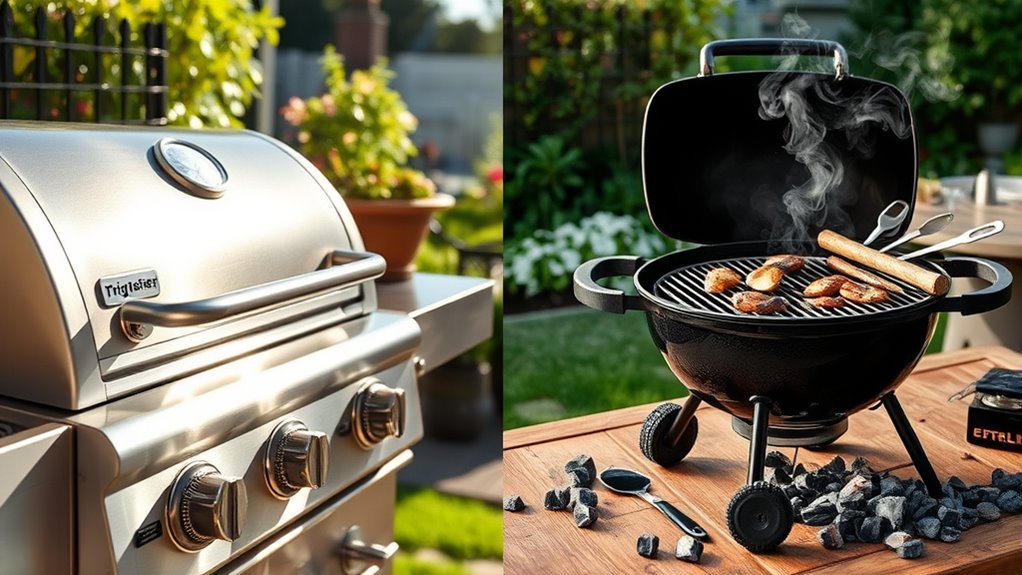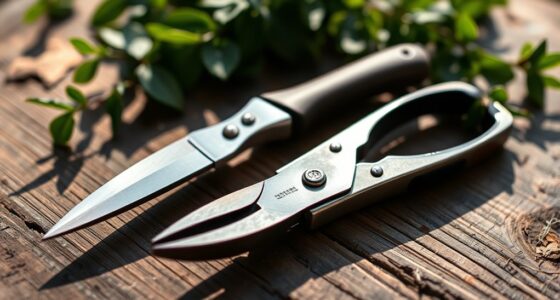When choosing between gas and charcoal grills, consider your priorities. Gas grills ignite quickly, offer precise temperature control, and require minimal cleanup, making them convenient for quick meals. Charcoal grills provide a richer, smokier flavor and can reach higher temperatures for searing, but they take longer to heat and involve more cleanup. Your choice hinges on flavor preferences and convenience needs. Stick around to discover more about which grill suits you best.
Key Takeaways
- Gas grills ignite quickly and offer precise temperature control, making them ideal for efficient cooking and convenience.
- Charcoal grills provide a richer, smokier flavor, perfect for enhancing the taste of thick cuts of meat.
- Consider cleanup and maintenance: gas grills require minimal effort, while charcoal grills involve ash removal and more upkeep.
- Budget plays a role; charcoal grills have lower upfront costs, while gas grills may save on maintenance long-term.
- Portability differs; charcoal grills are generally more versatile for outdoor use, whereas gas grills need a gas source for operation.
Understanding the Key Differences Between Gas and Charcoal Grills
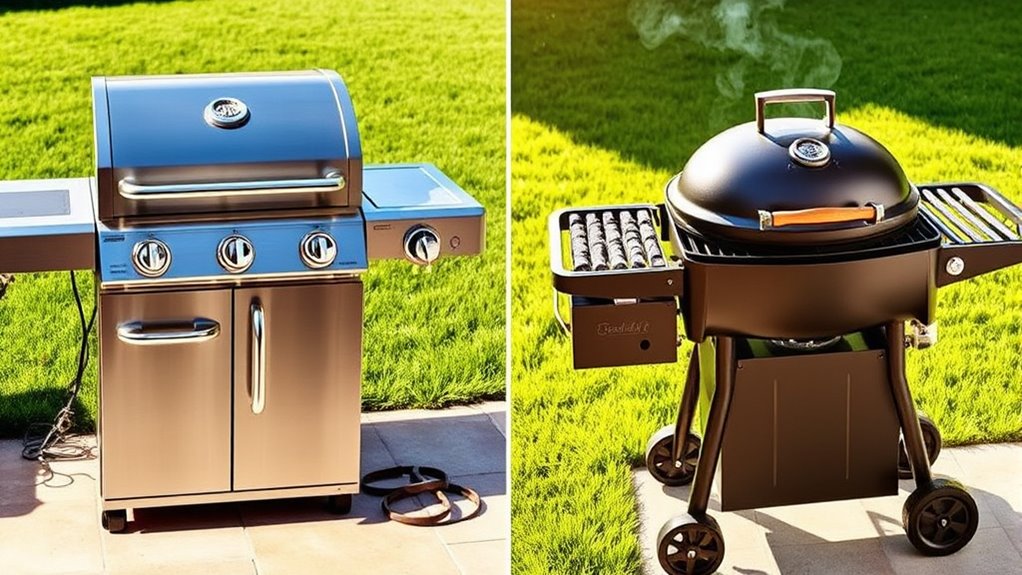
When deciding between gas and charcoal grills, you’ll quickly notice some key differences that can impact your grilling experience.
First, consider cooking time; gas grills ignite quickly, usually ready in under 10 minutes, while charcoal grilling typically takes at least 30 minutes to heat properly.
However, charcoal grills can reach higher temperatures, ideal for searing.
Regarding flavor profile, charcoal provides a rich, smoky flavor, while gas produces a cleaner taste.
Cleanup also varies: gas grills require minimal effort, mainly wiping grates, whereas charcoal grilling involves ash removal.
Finally, think about the cost—charcoal grills are often cheaper upfront, making them an attractive option.
Weigh the pros and cons of these types of grills to find what suits your needs best.
Flavor Profiles: Gas vs. Charcoal
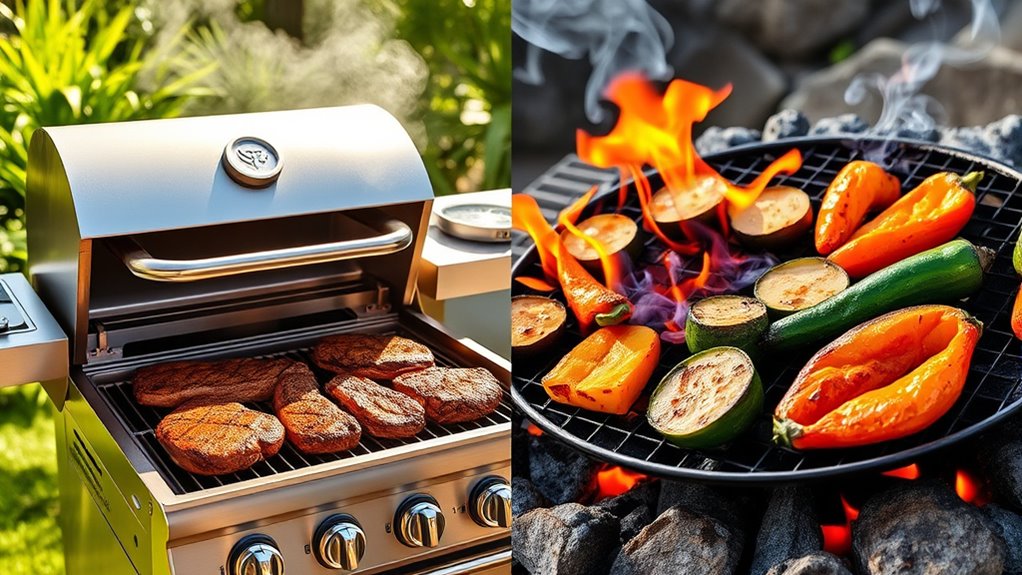
While both gas and charcoal grills have their merits, the flavor profiles they produce can markedly differ.
Charcoal grilling offers a richer, smokier flavor thanks to compounds released during combustion, making it perfect for thick cuts of meat and long-cooking foods. You’ll enjoy an intense heat and a pronounced smoke flavor that enhances the overall taste. Additionally, the butter production process can utilize similar techniques to enhance flavor in grilled dishes, making it a versatile ingredient for marinades and toppings. Moreover, grilling with charcoal can be complemented by chia seed jam, which adds a unique and healthy twist to your grilled meats. Many chefs also recommend using smoked spices to further elevate the flavor of your grilled dishes. The use of charcoal also introduces fiber-rich ingredients like chia seeds, which can enhance the nutritional value of your meals.
Charcoal grilling delivers a deep, smoky flavor, ideal for thick meats and slow-cooked dishes, enhancing every bite.
In contrast, gas grills provide a cleaner taste, primarily generating water vapor and CO2, which preserves the food’s natural flavors but lacks the depth of smokiness. If you want that complex flavor, charcoal is your best bet.
Though both can achieve some smoke flavor, charcoal excels in delivering that rich, satisfying taste, especially when using direct wood placement. Additionally, the choice of projector type can impact the overall viewing experience in home cinema setups.
Temperature Control and Cooking Techniques
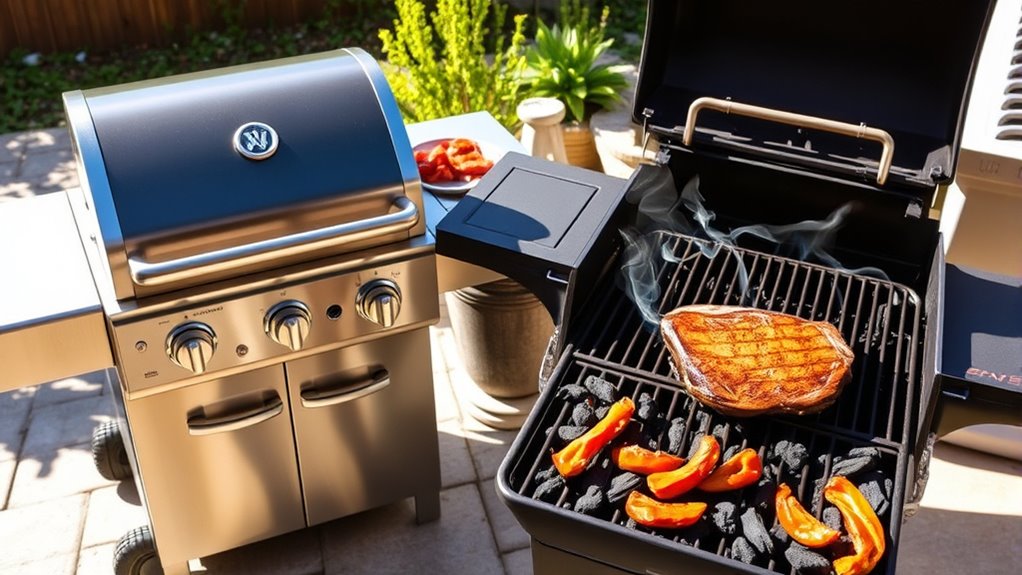
Understanding temperature control and cooking techniques is essential for getting the most out of your grilling experience.
Gas grills offer precise temperature control with adjustable burners, allowing you to make quick heat adjustments. This results in consistent cooking outcomes. Additionally, effective heat management is crucial in achieving desired grilling results. Heat pumps, for instance, are known for their ability to lower operational costs by efficiently converting energy into heat.
Charcoal grills, on the other hand, reach high heat through direct heat and can maintain steady temperatures for longer due to better heat retention from coals. Additionally, using airflow management techniques will help you achieve optimal temperature control on charcoal grills. Regular maintenance, much like with heat pumps, can enhance the performance of your grilling setup.
You can master indirect cooking and smoking techniques on charcoal grills by creating distinct heat zones. While gas burns efficiently, managing airflow is key on charcoal to regulate temperature. Your choice of fuel source will impact your cooking techniques, so consider what fits your grilling style best. Additionally, using heat retention techniques can significantly improve your cooking results on charcoal grills.
Convenience and Maintenance Considerations
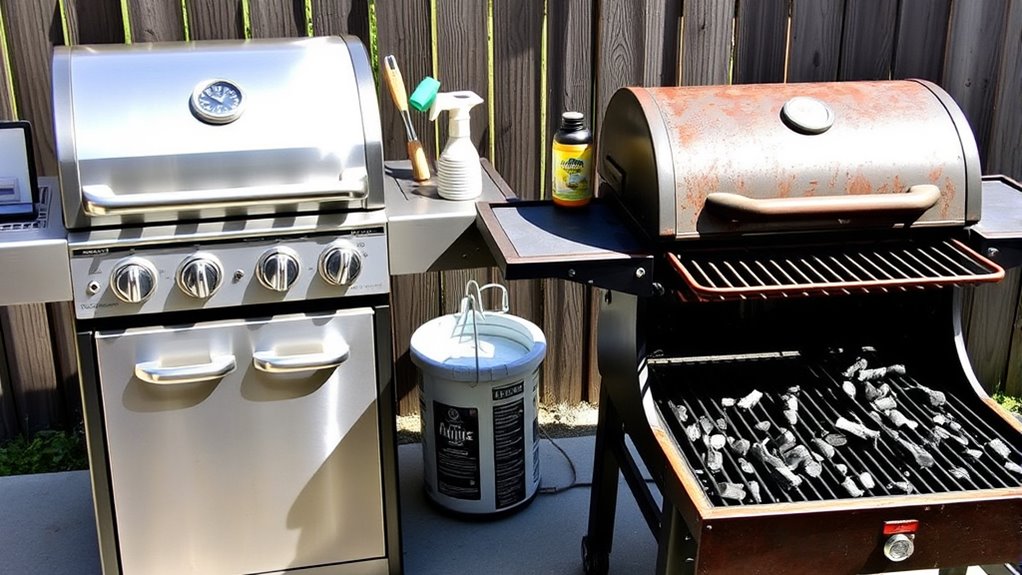
Gas grills typically shine regarding convenience and maintenance, making them a popular choice for many grill enthusiasts. They ignite quickly and can be ready in under 10 minutes, unlike charcoal grills, which take at least 30 minutes to heat up.
During grilling sessions, you’ll appreciate the ease of immediate temperature adjustments with gas grills, while charcoal grills require more effort to manage airflow. Clean-up is minimal with gas grills; you mainly need to empty the grease collection trays. Regular maintenance, such as routine inspections, can further enhance the longevity of your gas grill, similar to how freshly squeezed juices require careful storage to maintain their quality. Additionally, gas grills are often designed with energy-efficient features that help reduce operational costs. Investing in a gas grill can lead to lower maintenance costs over time compared to charcoal alternatives.
In contrast, charcoal grills demand ash removal after each use, which can be messy. Although the initial setup for gas grills may take longer due to connecting to propane tanks, the overall convenience and lower maintenance effort make them an attractive option. Additionally, gas grills are often more energy-efficient options compared to their charcoal counterparts, further enhancing their appeal for quick and hassle-free cooking.
Making the Right Choice for Your Grilling Needs
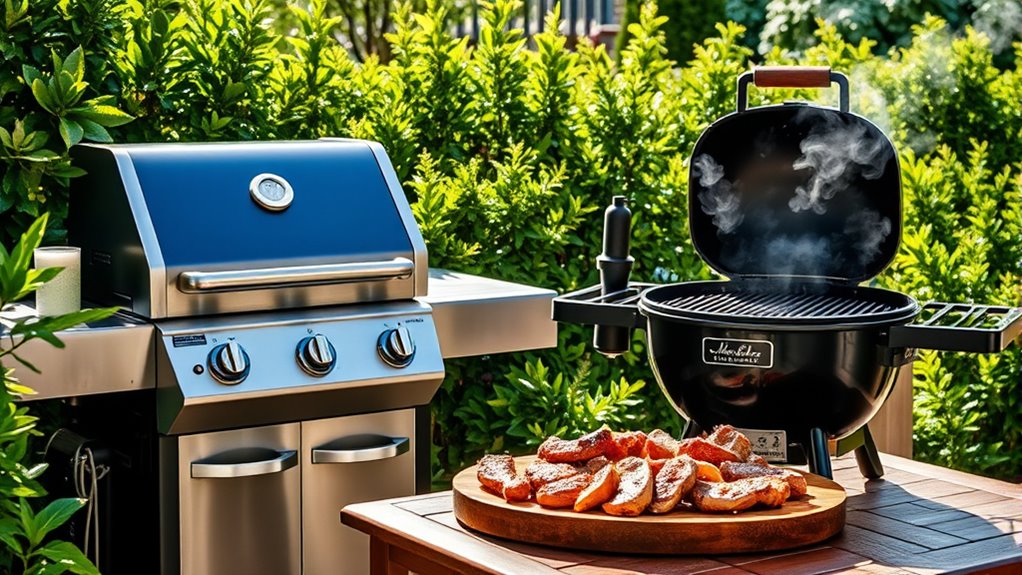
How do you decide between a gas and charcoal grill for your culinary adventures?
It boils down to your cooking style and needs. If you value less time and convenience, gas grills ignite quickly and are ready in under 10 minutes, making them perfect for midweek meals and larger gatherings. Additionally, modern grilling systems often incorporate advanced filtration systems, enhancing the overall cooking experience by reducing smoke and odors. Regular maintenance of your grill can ensure optimal performance and longevity, similar to how proper maintenance is crucial for vehicles. Individuals with emotional dysregulation may find that the convenience of gas grilling helps reduce stress during meal preparation. Furthermore, understanding the state tax implications of your cooking-related expenses, such as a new grill, can impact your overall budget in retirement.
However, if you’re after those perfect grill marks and a richer flavor, charcoal grills reach higher temperatures that excel at searing meats.
For those seeking perfect grill marks and a deeper flavor, charcoal grills excel at high-temperature searing.
An important factor is temperature control; gas allows for precision, while charcoal requires skill in managing airflow.
Consider your budget too—basic charcoal grills start around $60, while quality gas models often cost several hundred dollars.
Ultimately, the best choice depends on whether you prioritize convenience or flavor. Additionally, understanding water sources can be crucial for outdoor grilling in remote locations.
Frequently Asked Questions
Is It Healthier to Grill With Gas or Charcoal?
When you’re deciding whether it’s healthier to grill with gas or charcoal, consider the emissions produced.
Gas grilling usually releases fewer harmful substances, making it a cleaner option.
Charcoal can create potentially harmful compounds, especially when meat is overcooked.
However, you can mitigate some risks by using natural briquettes and cooking at lower temperatures.
What Type of Grill Is Healthiest?
When it comes to choosing the healthiest grill, gas grills generally give you a cleaner cooking experience.
You’ll avoid harmful emissions and the need for lighter fluid, which can taint your food with unwanted chemicals.
While charcoal grills can create delicious flavors, they often produce harmful compounds linked to health risks, especially at high temperatures.
Does Food Taste Better on a Charcoal Grill or Gas Grill?
When it comes to taste, you’ll often find that food grilled on charcoal has a richer, smokier flavor.
The direct heat from hot coals helps achieve better browning and crusting, enhancing the overall taste of your meals.
If you’re grilling fatty cuts like steak or chicken, the drippings create a unique flavor that gas grills just can’t match.
Is It Healthier to Grill With Wood or Charcoal?
Grilling with wood is like stepping into a flavor paradise, while charcoal can lead you down a health minefield.
When you choose wood, especially natural hardwoods, you’re reducing your exposure to harmful chemicals found in traditional charcoal.
Plus, using natural briquettes made from pure wood can elevate your grilling experience while minimizing health risks.
Conclusion
Ultimately, choosing between gas and charcoal grills depends on your lifestyle and grilling preferences. If you love that smoky flavor and don’t mind the extra effort, a charcoal grill might be perfect for you. For instance, imagine a weekend barbecue with friends, showcasing perfectly seared steaks on a charcoal grill, igniting nostalgia. On the other hand, if you’re after quick, hassle-free grilling, a gas grill will serve you well. Whichever you choose, happy grilling!
